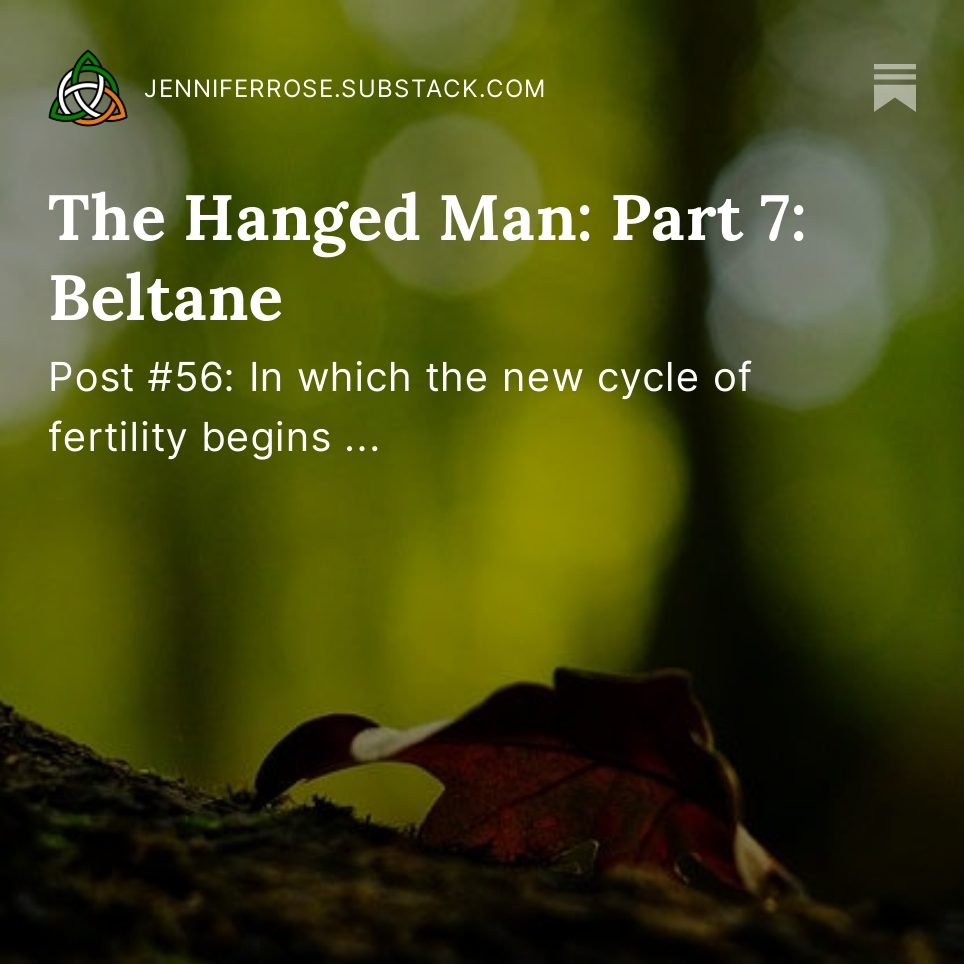by Jenny Rose | Nov 4, 2023 | Emotional Intelligence, Feelings, Love
Elizabeth Gilbert is on Substack, and I follow her. Best known for her breakout novel, Eat, Pray, Love, she’s a journalist, speaker, and writer. Her Substack is called Letters From Love and more than ten thousand subscribe.
Letters From Love is the most uncomfortable Substack I read. I write that statement with wry humor. The premise is writing love letters to oneself.

Photo by Angelina Litvin on Unsplash
When I first came across it, I was equally horrified and attracted. I poked around, reading here and there, and realized quickly Elizabeth and I share certain experiences. I already knew this, because years ago I came across her brilliant piece on tribal shaming, which I immediately blogged about.
It takes one to know one.
When I found Gilbert on Substack I subscribed, so her newsletter comes regularly into my Inbox. Sometimes I ignore it for days, but sooner or later I open it and read. She posts love letters she’s written to herself. Publicly! She also has a podcast, does interviews, and posts love letters others have written to themselves.
(Cringe.)
I can’t help but notice my violent reactions. Me being me, I don’t choose to turn away and read something more comfortable. I have questions. What is my deal? I’ve been working for more than ten years on self-care and self-love, on reparenting myself and healing old trauma. Why am I not delighted with the idea of a practice of writing love letters to myself?
(Shudder.)
My first reaction is to crawl through the screen and beg her not to expose herself like this. Beg them all not to expose themselves. Don’t they understand how dangerous it is? Haven’t they learned a display of this kind of vulnerability will attract destroyers with stones and blades and (worst of all), terrible, terrible words of contempt? Oh, and don’t forget lethal indifference.
(If you’re not paying attention, I’ve now told you everything you need to know about the way I grew up.)
Except clearly the sky is not falling. More than ten thousand people are reading Gilbert’s love letters, and she goes on writing and publishing. The discussions within her community are neither indifferent nor contemptuous. On the contrary, they’re supportive and tender.
Which leads me to conclude my red alert reaction is about me rather than the practice of writing love letters to oneself.
Hm.
How can they do this? I wondered.
Could I do this?
No, no, no, not to publish! I reassured myself hastily. Just for me. Like my journal. My eyes only. A delete key. No one ever needs to know.
But there was a problem. Elizabeth writes to herself with endearments. Creative, funny, quirky endearments, like “my glinting little piece of foil from a gum wrapper.”
OK, now that’s fun! Words are so much fun!
What kind of endearments would I address myself with?
I’ve had pet names for my kids and my animals. No one else, really. Certainly not myself. My tone with myself has mostly been the harsh, hectoring, contemptuous, cold voice I internalized from the adults around me as a child.
More discomfort.
But, words … If I had a child just like the child I was, what endearments would make her giggle and feel loved and seen?
So I started a list of whimsical endearments. A very private list. So don’t ask! I was a little ashamed of myself, but no one else need ever know …
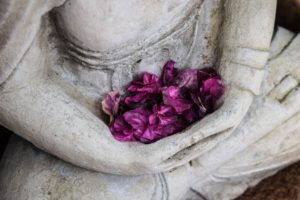
Photo by Chris Ensey on Unsplash
The list was fun, because it was a creative exercise. I can do creative exercise. It occurred to me part of my resistance to love letters (either giving or receiving) has to do with my disbelief in words. (Ironic.) Words can say anything. People say anything. The proof is in action. The older I get, the less interested I am in words, and the less I believe them. Demonstrate. Act. Show me, don’t tell me. As I’ve worked to heal I’ve developed routines for self-care, for eating well, for exercise, for sleep, for writing. I’ve been successful, and take much better care of myself than I ever have before. I take better care of myself than anyone ever has before, in fact.
But I haven’t written love letters to myself. I would have told you I could do so, if I wanted to. If I thought they’d have value. If I thought I’d believe them …
I grew up with emotional withholding. I’ve believed I’ve broken that pattern with my own children and my loved ones, including my animals. But now I wonder. Isn’t demonstration of love with no words a little sterile? I know the mixed message of loving words and abusive actions is devastating. Is active demonstration of love without words also confusing? Am I withholding from myself? Obligation, responsibility, duty – all these I’m very good at. But those are stony words. Where is the tenderness, the humor, the generosity? How about compassion? I feel those for others. I’ve spoken them from the heart; written love poems, love letters, notes, and cards – for others. Could I learn to feel and express them for myself?
Then I got sick with COVID, the events of the last couple of years (traumatic, protracted move; my mother’s decline and death) caught up with me, and I felt miserable. At once, I began putting pressure on myself to get back to writing, get back to work, get back to exercise, take out the trash, do the shopping, and generally pull myself together, because, after all, the world is full of bleeding, suffering people and I have a good life, a privileged life, and don’t deserve to feel sorry for myself and be lazy.
Not a love letter, in other words.
In the middle of the week during which I sat on the couch, alternately shivering and burning and blowing my nose, I wrote myself a love letter.
Well, maybe a let’s-see-if-I-can-tolerate-you letter.
It was an extremely strange experience. In fact, it made me cry, which didn’t help my congestion. Or my cough. At the time I had no sense of taste or smell, and I reflected that it was like that. When I tried to turn toward myself with love, tenderness, affection, whatever you want to call it, there was nothing. Just … nothing. A thick, numb shell between me and myself.
It made me so sad. Immediately upon the heels of that, I was ashamed. Because, you know, self-pity.
Almost as bad as self-love.
Wait now, what?
It’s bad to love yourself … if you don’t deserve it.
And, readers, I thought I’d left that belief far behind in the dust.
Then I began to feel angry, and I told myself I was going to start practicing writing love letters to myself. Because I deserved and deserve love as much as anyone else. I’m not important enough to be the most loathsome person in the world.
Questions:
- How does the idea of this practice make you feel? Can you write a love letter to yourself? With endearments and everything?
- If you could write a love letter to yourself, how would you feel about making it public?
- What do you most need to hear from someone who loves you? Would it have power if you wrote it to yourself?
Leave a comment below!
To read my fiction, serially published free every week, go here: 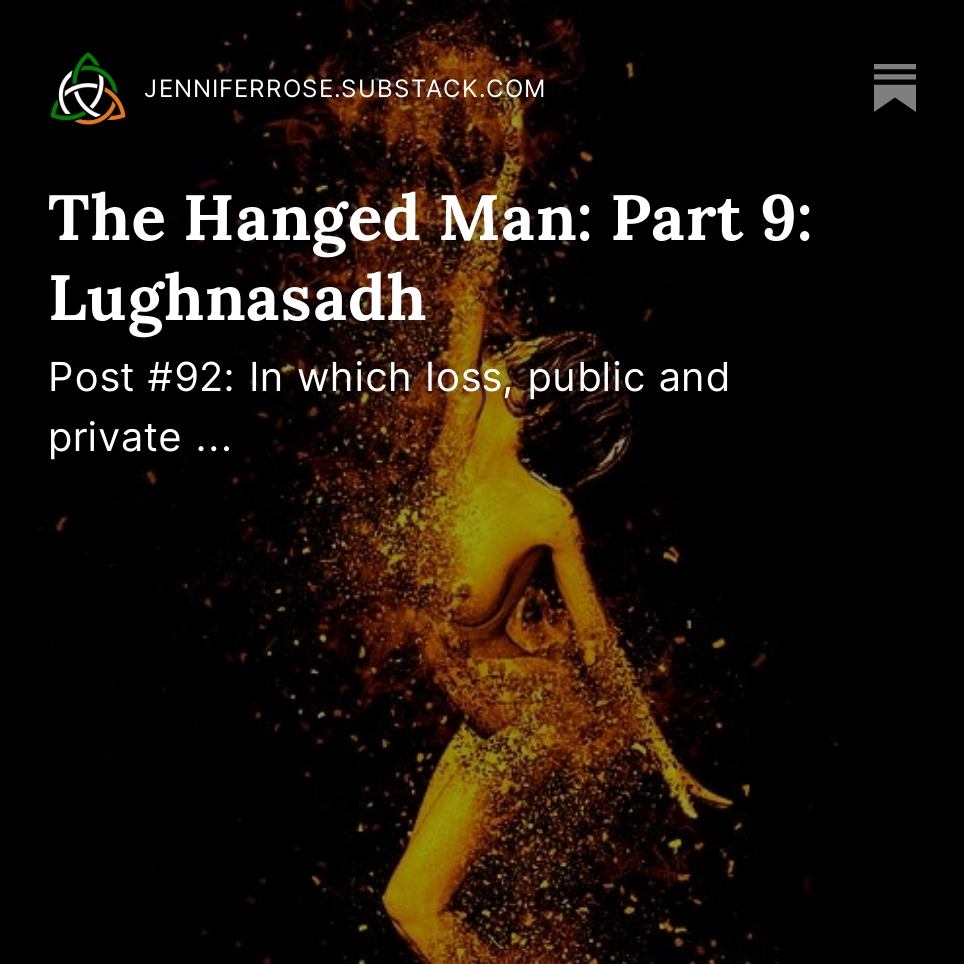
by Jenny Rose | Aug 26, 2023 | A Flourishing Woman, The Journey
Two weeks ago my 87-year-old demented mother fell in her memory care unit and broke a hip for the second time in less than a year. Eight days later she died in a hospital under the care of Hospice, my brother at her side.
Until I sat down to write this, I was afraid I had lost my words, lost the need to write them, lost the ability to form them into meaning. But I haven’t. I’m still a writer. This remains. That’s a relief.
Oh, I’ve been writing. Lists. Notes. An obituary. Texts. Updates to family and friends. Daily journaling. But it hasn’t been creative writing. It hasn’t been this blog, or my fiction. These last two weeks have passed by, the first in a blur of pity and anguish, and the second in numb relief glazed with exhaustion, and I have not posted or published. I haven’t kept track of the days; they spill into one another, as the days and nights blended together while my mother lay dying and we waited.
For a time words have simply been inadequate to relieve the pressure of my feelings in any organized or coherent way. They flew away from me, leaving a series of kaleidoscopic impressions, sensual details so vivid they frightened me with their power.
While my mother lay dying I reread my childhood copy of The Wind in the Willows by Kenneth Graham. Reading has also largely failed to sustain me during this time. I find myself unable to focus. I read a paragraph or two, and then realize I’ve been sitting staring into space, out the window or into the garden, not hearing, not seeing, not even thinking. Just sitting. But I needed a companion for the night watches, something comforting and familiar. Something innocent.
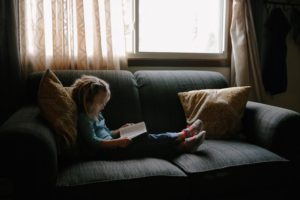
Photo by Josh Applegate on Unsplash
The fan in my window purred during those hours, blowing in cool night air and an occasional moth or mosquito. Every night, when I go to bed, I light a tea light in a candle lantern. When calls or texts reached me, I knew when I opened my eyes if it was before midnight or after, according to whether the candle still burned. Propped up on pillows, glasses on, my small bedside lamp alight, I spoke to Mom’s facility staff, emergency department doctors and nurses. I texted with my family. I read, the well-remembered illustrations making me smile as I communed with Rat, Mole, Badger, and the ridiculous Toad, finding respite for a few minutes before turning off the light and lying awake in the dark room, listening to the fan, feeling my heart beat, resting, breathing, waiting.
While my mother lay dying and after, I’ve stained wooden pallets. My partner and I are building a 3-bin compost system against the back yard fence. We set out sawhorses. I found an old brush, a rag, a stirring stick. We bought stain. I lay a pallet on the sawhorses, brush away dirt and debris, and paint every surface. The raw wood soaks in the oil-based stain, a rich brown color. The brush is more and more frazzled. I’m sloppier than I would be if painting a wall. The pallets are splintery. Some of the boards are split or loose. I bend over, the sun hot on the back of my neck and my bare arms. Mosquitos bite me. Stain drips between the boards as I brush their edges, dappling the sawhorses, falling onto the filthy old cream-colored jeans I’ve been wearing all summer in the garden, and onto my worn-out sneakers, used only for outdoor work now. As I maneuver between the boards, stain smears the skin of my hands and wrists. I kept the phone close, in a patch of shade.
This is the only sustained work I’ve been able to do. Now and then I wash a few dishes. I’ve done a couple loads of laundry. I go out into the garden, note the trimming, pruning, composting, mowing waiting to be done, and turn away. It all feels like too much. I don’t know where to start. It’s impossible to open the garden shed, get the tools, wheel out the wheelbarrow.
But the pallets. I can do that. It’s a simple task, direct. I don’t need to make any choices. Each side takes fifteen or twenty minutes. When I’ve finished a side, I wrap the brush in an old plastic bag, cover the can loosely, let the pallet dry an hour and a half in the sun. Then I turn it over and begin again. Two coats each side. One side after another.
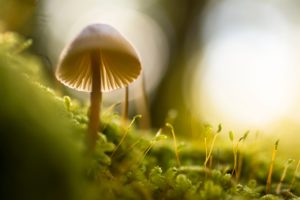
Photo by Manuel Barroso Parejo on Unsplash
The smell of stain. The prickly feeling of intense sun on my skin. I think about compost, recycling, breaking down life to sustain new life. I think of ashes to ashes and dust to dust. I wonder if I’ll ever use the compost bins without thinking of Mom. I wonder who names the colors of stain and paint. I chose ‘Canyon Brown’ for this project. I vaguely hear birds, cars passing by. Small groups of women walk by in clumps, hospital employees on their lunch break, talking about families, gardens, school starting, hospital gossip. I should be at work, on that same campus, just a ten-minute walk away. I should be, but I’m not. I’m here, staining pallets, waiting for Mom to die and then on bereavement leave.
Am I bereaved? How would I know? I wonder why I don’t care enough to follow the thought. I let it drift away.
I decide I want to make bread. I don’t eat bread often, so rarely make it any more. But my rosemary is bushy and ready to be harvested, and someone brought fresh home-grown garlic into work to share before … before all this. So I make a sponge, stirring together milk, a little sugar, yeast, water. I chop fresh rosemary and garlic, very fine. I take flour out of the freezer and let it warm. The dough is heavy under my hands, sticky at first and gradually becoming supple and smooth. The earthy smells of garlic and rosemary vanquish the smell of stain in my nostrils. I turn the dough, kneading. The timer ticks off seconds and minutes. I clean the bowl, grease it, use a linen towel to cover it for rising. I put it in the oven for safe keeping, because the cats are likely to lie on it or step in it, or nibble at it if I leave it out. The bread, like the pallets, is a project in stages. I don’t have to focus on any one step for more than a few minutes. I move between the kitchen and the back yard with my phone, not thinking, not planning, just taking the next step, and the next. I can’t remember times, so I write them down. About 90 minutes for the stain to dry. An hour for the bread to rise. Another 90 minutes for the pallet to dry. Another hour for the shaped loaves to rise. Another 90 minutes. An hour for baking.
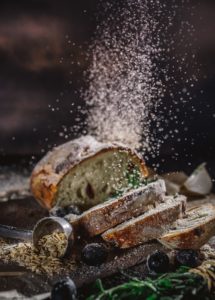
Photo by Helena Yankovska on Unsplash
At the end of the day, I have two enormous round loaves of bread to cool, slice, and put in the freezer. This batch will last me for a year. I have finished another pallet. I leave it on the sawhorses to dry overnight. My stained hands smell like garlic.
I haven’t cried since the last night call, my brother telling me Mom was gone. Perhaps I cried all my tears before she went. I receive condolences with all the grace I can muster. People talk to me about God and heaven. They talk to me about Mom. They talk to me about their own experiences of death. I try to be gracious. I try to look like I’m listening, like I’m there. With my brother and sons, my partner, I can be real. The faces of my friends comfort me. They don’t need anything from me. They don’t ask for anything. I can see their concern, their love for me, their sorrow. They hug me, and smile. They talk to me about small things, the daily things I’ve lost track of – family, friends, outings, work. I pick up a friend’s daughter and feel almost normal, doing an ordinary thing, a manageable task I cannot fail.
I realize part of my feeling of unreality is rooted in a loss of identity. I catch sight of myself in the bathroom mirror and pause. I rarely look at myself in the mirror. This woman, who is she? She isn’t the disappointing daughter any more. She can’t be, if there’s no mother to disappoint. What else is she? Who else is she? I look into my own eyes and feel no shame, no guilt. Did Mom take them with her? How will I navigate my life without them on my shoulders, without the knowledge that Mom is alone, suffering, needing? For fifty years I was at her side, day and night, year after year, ineffectual, helpless to fix or heal her physical pain, her dysfunction. Feeling my failure, my powerlessness, knowing I more often made it worse than better as time went on, even though she clung closer and closer to me as she aged. She could not release me and I almost waited too long to release myself.
But the geographical distance I put between us brought no real release. She still suffered. She declined, grew confused. Her body aged and began to run down. She was just as lonely without me as she was with me, just as emotionally remote, just as relentlessly needy. She cut herself off from me, but I still carried her. Internally, I still orbited around her. I still agonized for her.
I still loved her. I always loved her. I accepted she could not find me lovable, but it made no difference. She was my mother, and I loved her. All I ever wanted was for her to be well, and happy, but I could not make it so, and in her eyes it was my responsibility to fill her need. Indeed, she told me long ago her physical pain started with her pregnancy with me. I accepted the blame, and was heartbroken, and have tried desperately to make up for it ever since.

Photo by Nicole Mason on Unsplash
Now Death has come to stop her suffering. Has mine stopped, too? I don’t know. I’m too numb to tell. But I feel different. I feel … released. I prayed for her release and freedom, not mine, but perhaps they were linked. Many times a day I think of her, hear her voice in my head, and I realize with a painful clench of my heart she’s gone. It’s over. I can’t humiliate her anymore because of what I wear, how my hair looks, what I do, who I sleep with, or, most of all, what I write. She’s moved beyond humiliation. I can’t fail her anymore. And that’s a soaring, joyful, unbelievable thought. I can’t fail her anymore.
I wonder if I’ll finally feel good enough, if I’ll do a good enough job, live a good enough life. Might I simply enjoy my small talents, my joyful work, my community, my garden? Might I immerse myself in the loveliness of life without the gnawing guilt of knowing I’m happy when she’s not, I’m companioned when she’s not, I’m relaxed and rested and peaceful when she’s not, I’m laughing when she’s not?
The last couple of times I spoke to Mom, I told her it was okay to rest now, she could let go, be at peace. We told her her loved ones and animals were well and happy, and she could relax.
I told her, and I meant it. Was I telling myself, too?
She could not release me, yet I am released. Did Death break the chains when he gathered her in? Or now, at last, have I released myself, now that she’s moved entirely out of my power and knowledge?
As I write this, it’s Wednesday afternoon. I have finished another pallet. I have written. I have sat in the sun, read a paragraph or two at a time of an old Edna Ferber novel, rested my eyes on the garden. The lily stems are turning dry and brown, as are the leaves. Sunflowers bloom. The sun is hot. The phone has been sitting on my kitchen table all morning, silent, as I go in and out. I have balanced my checking account, scheduled a private swim lesson in a home pool, ironed a tablecloth and three napkins. Tomorrow I go back to work.
A new page of my life has turned. I can’t read it yet. It’s enough to sit with it in my lap, letting my gaze wander over blue sky and afternoon clouds, the garden, our old cars, the worn wooden boards of the porch, the bruise on my left knee, the mosquito bites on my right arm, the smears of stain on my hands. It’s too bright in the sun to read this new page, too hot, too much effort. I’ll read it later.
I dare to be at peace.
Daughter’s Dream (July 2014)
I dreamt I carried my mother.
The car had slipped out of her control
with a blind will of its own,
and I thought
I knew she shouldn’t be driving.
We landed in water.
I swam to her and held her in my arms.
Then the water was gone.
I carried my mother,
but she left my embrace,
slipping free of her embattled flesh.
Irrevocably, I felt her go.
I was alone.
I carried the vacant body of my mother.
Empty beds stood all around me
but the sheets were disordered and dank,
Smeared with shit.
I carried the vacant body of my mother.
There was no clean place to lay her down.
I carried the vacant body of my mother,
seeking to slip into my own freedom,
seeking absolution.
To read my fiction, serially published free every week, go here: 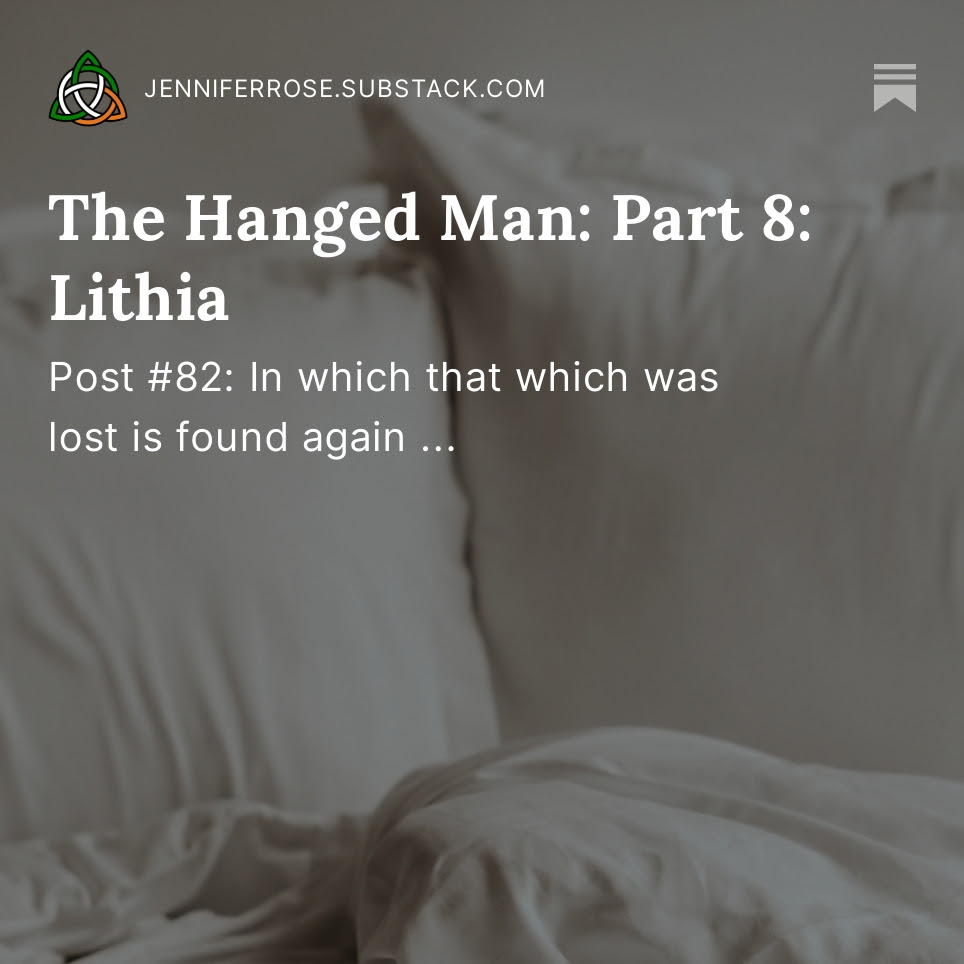
by Jenny Rose | Jul 8, 2023 | A Flourishing Woman, Spirit
We’re having a rainy summer here in Maine. I don’t mind. In fact, I feel grateful when I’m reminded how many billions of people are suffering extreme heat conditions and other severe weather around the planet.
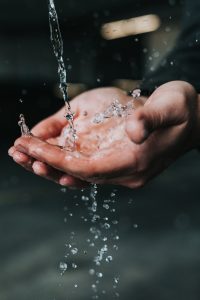
Photo by Nathan Dumlao on Unsplash
It does make it challenging to get outdoors, however. When a day off coincides with no rain, I disappear into the garden.
This was my first spring in our new house. Last spring and summer were necessarily about surviving the move. Outdoor work consisted of picking up trash and getting to know our little piece of the world.
This spring I went to work as the snow melted, raking, pulling weeds, thinking about where to put a compost system, laying out new beds. A morning here, an afternoon there, a snatched few hours in between work and life’s other demands.
I notice when I do put everything aside to play in the garden I’m filled with toxic shame at the end of the day. Certainly, I dug and weeded, knelt and stooped, barrowed and raked, pruned and planted and trimmed until I was sore and exhausted as well as renewed by my time under the sky on the earth’s body. In proportion to my joy I feel self-hatred. I did not work in the house. I did not pay bills. I did not do laundry. The sink is full of dirty dishes. The cats didn’t get my attention. I didn’t work on my blog or fiction. Instead, I ground dirt into my hands and nails, into the knees of my old jeans. My filthy clothes stink of bug spray. I’m sweaty, sunburned, and thirsty. I’m happy.
And there’s the rub.
Happiness is Not Allowed. If it makes me happy, I shouldn’t be doing it. If it makes me happy, I shouldn’t get paid for it. The only truly productive way to live is to do what is not joyful. Happiness is selfish and lazy.
The first commandment of life is Make Yourself Useful. Happiness doesn’t come into it.

Photo by Cristian Newman on Unsplash
This internal voice has always been with me. I’m sure I wasn’t born with it, but when my memory starts the voice was already deeply rooted in my mind. The only things worth doing in life were repetitive, obligatory, dutiful activities. Responsibilities. Bonus points if the tasks were in service to someone else. An activity done for personal pleasure was a threat, a disobedience, a terrible betrayal.
Other people in my world were not happy; therefore, I had no right to be. Ever.
I recognize the lies, the rebellion and resentment, and the sinking heart accompanying this twisted belief. I know where the belief comes from. But still, still it triggers painful, cringing shame.
Yet I continue to snatch what hours I can to be in the garden. As I work, I think about my shame, the sadness of people who cannot allow themselves or anyone around them to be happy, and all the ways this particular belief has limited and inhibited me. So many of my passions are muted and hidden in the privacy of my own heart: Dance, writing, gardening, swimming. Oh, people know they’re activities I enjoy, but I hide my absolute, blazing passion for them behind a casual demeanor. Because I’m ashamed.
We have a corner lot, so a comparatively large garden space. I frequently clear patches of earth that lie bare under the sky, soaking in rain, sunshine, and receiving whatever seeds come. Sometimes it’s weeks before I get back to that same little patch, and I’m always delighted and surprised by how quickly new things come to grow wherever I’ve made a clearing. Some would call it all weeds. I call it life.
I’ve been thinking about the hard, muddy work of clearing, walking away, and then the miraculous return of life while we’re looking in another direction. I came across an article recently entitled “We are Defined by the Things We Don’t Do.” I’ve been thinking about that, too. Am I defined more by my choice to garden during a sunny afternoon or the fact that I didn’t clean the kitchen?

Photo by Stephen Leonardi on Unsplash
My hours in the garden, in the pool, dancing, writing, clear the ground of my being. Into that cleared ground come words, inspiration, delight, peace, rest, freedom. Without those hours to nurture and refresh me, my soil would grow hard and compacted, unreceptive and sterile. I cannot sustain myself with an endless round of housework and taking care of business. It’s not enough. No amount of efficient, effective housework gives me the joy I feel in the garden, or in typing words onto the page.
In short, my understanding of what it means to be “productive” does not make me happy or healthy.
So, what does it say about me as a person that my joy comes from such “selfish” and “lazy” activities? What kind of a terrible person chooses to grub in the garden rather than do the dishes and emotionally labor for others? What kind of a terrible person accepts payment for doing her heart’s delight?
A person like me, readers. A person like me.
I read a lot about mindfulness. I practice it in many different ways. It occurs to me, however, that my best moments and hours are spent mindlessly. The rhythm of swimming. The wordless seduction of music liberating me into dance. The sweat and texture and smell of working in the garden, the feel of the tools in my hands, the itch of a mosquito bite, the sear of sunlight on the tender skin at the nape of my neck. I’m not thinking. I’m not planning. I’m not trying or worrying. I just am. I have truly disappeared into the garden. And in that cleared ground of being the rest of my life, the necessary, the daily, the trivial things like wiping the counters and making the bed, are deeply rooted.
It’s in mindlessness that I find mindfulness. Mindlessness is a cleared patch of earth, dark, moist, rumpled, with seeds and roots and microbes and insects hidden below and the sky above. What will come to grow and live in that space? What will I weed out, and what will I nurture? What gifts, what treasures will come into the ground I have cleared?
The answers to those questions are none of my business now. The ground is cleared. Now I walk away, look in another direction, clear a patch on another side of the house, under the magnolia, maybe, or alongside the old well. Rain will come, and sun. Birds will come, insects. Roots and seeds. I will go inside, scrub the first layer of dirt out from under my nails, off my skin and cuticles. I’ll strip down and wipe insect repellent and sweat from my skin, treat bug bites. I’ll rehydrate, change into clean clothes. I’ll feel the tension between my pleasure in my outside work and the shame and reproach of the undone inside work.
And somewhere, when the time is right in some future moment, I’ll go back to the memory of that patch of earth, still chilly from winter when I cleared it, now thick with new life that crept in when I wasn’t looking, and I’ll find meaning and mindfulness. I’ll find creative inspiration. I’ll find words and peace and clarity.
I’ll find joy.
Questions:
- Where do you do your most joyful work?
- How successful do you feel at balancing the necessities of your life with private pleasure right now, today?
- Do you have an active, nasty, mean-minded internal critic? How do you shut that voice up? Do you recognize the voice as belonging to some person in your life?
Leave a comment below!
To read my fiction, serially published free every week, go here: 
by Jenny Rose | Jun 10, 2023 | Connection & Community
I’m living inside this poem right now:
Ozymandias
I met a traveller from an antique land
Who said: “Two vast and trunkless legs of stone
Stand in the desert … Near them, on the sand,
Half sunk, a shattered visage lies, whose frown,
And wrinkled lip, and sneer of cold command,
Tell that its sculptor well those passions read
Which yet survive, stamped on these lifeless things,
The hand that mocked them, and the heart that fed:
And on the pedestal these words appear:
‘My name is Ozymandias, king of kings:
Look on my works, ye Mighty, and despair!’
Nothing beside remains. Round the decay
Of that colossal wreck, boundless and bare
The lone and level sands stretch far away.”
–Percy Bysshe Shelley
I want to escape this haunted place, walk away, never look back, forget, and wander among green trees, feeling their breath on my face. I want the blessing of the rain on my skin, to plunge my hands into rich soil, lie open to birdsong and the sun’s touch.
I want to be free.
Yet, again and again, I find myself crouching in front of that shattered visage, tracing the frown, the wrinkled lip, the sneer of cold command, unable to leave it or look away. I remember, and weep, and try to understand how something so mighty, so powerful, can fall and break apart, become nothing more than a colossal wreck in a desert in an antique land, unvisited, unremarked, nothing but time’s debris.
I was born in the shadow of those stone legs. I watched the sculptors at work, perfecting, shaping. I learned to worship Ozymandias, to make myself small before him, to endure his stony displeasure and indifference.
I did not know his name for a long time, not until I read this poem in high school. He was called Money. He was called Status. He was called Power. He was king of kings – that I never doubted. He required unceasing sacrifice; though I sacrificed everything I had, the sneer and wrinkled lip looked down upon me in infinite contempt. I looked upon his works and saw destruction and anguish. I saw lies and shattered lives and I despaired.

By Wei Gao on Unsplash
I left. I crawled away under the weight of my own inadequacy and unworthiness, across the lone and level sands, feeling his stone gaze upon me. I left, and one day I got to my feet and walked, and then I remembered how to dance, and swim, and the world opened up for me, showing me friendship, healing and joy.
Then, across the years, across the miles, Ozymandias fell, and the ground of my being has shuddered and convulsed with the impact ever since.
Understand, when he fell it all fell. Secrets lay revealed. Lies tumbled naked in the desert sun. Ozymandias, so carefully sculpted by generations before me, disintegrated. I understood then what I was taught to call Money was really named Fear. Status was in fact Shame. The wrinkled lip and sneer of cold command were not love, were never love. The king of kings lay forgotten, impotent, slowly wearing away to sand.
“Look on my works … and despair.”
It’s all gone, the gods of my childhood, the king of kings, the money, the status, the false power.
All gone.
Except for me. I am not gone.
In Maine, I eat and sleep. I journal and write. I walk to work, talk to people, laugh, teach. I sweat on the elliptical and exercise in the pools. I pay bills, make plans, file papers. I buy groceries and cat food. I do laundry and clean. I work in the garden. I’m distracted and absentminded, prone to sleeplessness and unexpected fits of tears welling from some deep unaware place. Or, on the other hand, maybe that place is all I’m truly aware of right now.
I talk and text and email to staff at the memory care center in Colorado where my mother resides, to her hospice team, to people at the agency we’ve now hired by request to provide extra caregiving. I hear about dementia, combative behavior, falls, sabotaged bed alarms, incontinence, sleeplessness, anxiety, medication adjustment. I am called to calm Mom down as though that was ever possible, as though she trusts me or ever took any comfort from me.
And part of me kneels in the desert, watching the family money (a mere pittance, judged by today’s standards rather than those of 100 years ago) and pride, that towering edifice more important than love, more important than health and happiness, more important than anything, sink into the desert like water. Is the desert powerful enough to cleanse it? Shattered Ozymandias still frowns, wrinkles his lip, sneers his cold command, but his works have disappeared even as he himself wears away.
Do I grieve or rejoice? I try to understand. I try to feel something more than despair at the waste of lives, at the dearth of love.
One thing I know: I will not stay here, beside Ozymandias. It’s a cursed place, a dark place. I will leave it to the circling vultures, the sun, the wind, and the silence. I will leave it to Time to wear away the sneer, the frown, the wrinkled lip, the trunkless legs. I left once, and I will leave again. I know this desert is a small place and the world is wide. I know who I am now. I know what love is, and that I’m capable of it. I am no longer alone.
I would have saved my family if I could have, but my gifts have no monetary value. What I have to give, what I am, cannot be bought or sold. I do not accrue a good rate of interest. I was not judged a sound investment. I did not increase my family’s status. Ozymandias, king of kings, was incapable of seeing or knowing me, being far too dazzled with his mighty works, dissolving now into sand while I myself, still vital and alive, pause to find absolution and mourn, groping for a way forward, watching it all decay.
Questions:
- What idols have fallen in your life?
- What family secrets have you discovered?
- Do you find comfort in the eventual fall of what once seemed all-powerful, or does it frighten you?
- How have you challenged your family’s definition and expectations of you?
Leave a comment below!
To read my fiction, serially published free every week, go here: 
by Jenny Rose | Jan 28, 2023 | Emotional Intelligence, Feelings
As I write this, I have just returned from a long journey across the country and into my past. I’m home again, but the journey is not over and I expect to retrace my steps back and forth for some undetermined length of time.
The physical journey, however long, is nothing to the internal journey I’ve undertaken through my memories, family dynamics and history, and so much of what has shaped my life and experience.
Before I left, I came across this poem by David Whyte:
Here in the Mountains
There is one memory deep inside you.
In the dark country of your life
it is a small fire burning forever.
Even after all these years
of neglect
the embers of what you have
known rest contented
in their own warmth.
Here in the mountains,
tell me all the things
you have not loved.
Their shadows will tell you
they have not gone,
they became this night
from which you drew away in fear.
Though at the trail’s end,
your heart stammers
with grief and regret,
in this
final night
you will lean down at last
and breathe again on the
small campfire of your
only becoming.
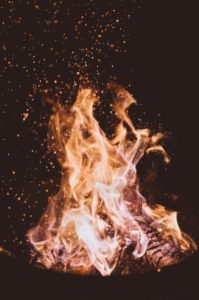
Photo by Joshua Newton on Unsplash
“Tell me all the things you have not loved.” This is an invitation I’ve never heard before. My focus has been on gratitude, on reframing, and on finding something good in every situation. I call myself a pessimist rather than an optimist, though I do leave windows and doors open for good things to happen while preparing for the worst.
My friends and I talk at work about the way we avoid “complaining.” A male coworker was taught as a child to refuse to give way to pain and illness, to work through it silently and privately without “complaint.” Is complaint the same as acknowledgment? I’m not sure. Three of us, all women, are more comfortable acknowledging our struggles and distress than our male friend, but none of us want to hear ourselves “whining.” Is whining the same as acknowledgment? I’m not sure about that one, either.
Because of my own confusion and blurriness around the terms we use and the cultural pressure towards toxic positivity, speaking about the things we have not loved is a jarring proposal. I carried it as I traveled on cars and buses, airport shuttles and airplanes. I hardly wrote at all over the last week. One journal entry by hand on the plane and the rest of my notebook filled with to-do lists, notes, names and numbers.
But I thought about things I have not loved.
It’s not just the invitation, though. It’s the way Whyte suggests all the things we have not loved are the background against which our lives are pinned, the shadows defining the light. I think of the night sky, gleaming with stars. What would the stars be without the blackness around them? I think of candle flames, fireflies, a lone campfire in the wilderness in the black night.

Photo by Jeremy Thomas on Unsplash
And isn’t it true that the things we have not loved don’t go away? Don’t they stay with us more inexorably, in fact, than the things we have loved? It seems so to me. Thus the fear, the drawing away, the heart filled with grief and regret. But at the core of our lives perhaps there is a small fire, patiently burning, waiting for us to come to our trail’s end. I think some would call the small fire God.
I realize one of the largest things I have not loved is love. A strange thing to realize, and a strange thing to say, I know. But so often my love has been helpless. The strong bonds, history, and feeling (all of which I mean by “love”) I feel for my parents, my brother, and my sons have been the greatest sources of pain in my life. Five vast, dark, wildernesses surrounding five campfires, these five who are flesh of my flesh, blood of my blood. These five who I could never stop loving, even if I wanted to. No matter how great the shadows around the fires, the flames burn, warm, beautiful, cleansing, regenerative. Often, I wish I could stand just outside the firelight, unseen, and simply love without fear, without pain, without wishing to be loved in return. But I do draw away in fear from the heat, the flame, the passion of the fire. I cherish the fires and would protect them with my life, but I fear them, too.
I have not loved the trauma and abuse that has shadowed what I love. I have not loved my disillusionment or the terrible choices I’ve made in building boundaries and learning to love myself. I have not loved my feelings of loss, insecurity, scarcity, and exile. I have not loved my pain and grief. I have not loved learning to let go.
I did not love walking into my mother’s home, the place where she has lived her self-imposed solitary journey into dementia and inability to care for herself. I did not want to follow her trail into the darkness of fear and denial, marked with soiled clothing and bedding, desperate and increasingly nonsensical and illegible notes and reminders. I did not want to go through drawers and cupboards of vitamins and supplements; over-the-counter remedies for pain, sleep, memory loss, skin problems and digestion issues. I did not want to fill trash bags with worn-out but never discarded clothing and shoes, a thousand used emery boards, outdated products and food.
I did not love going through every stitch of her clothing, sorting, washing, labeling with a laundry marker and packing it all to take to her new home in a memory care unit. The day after I carefully loaded her dresser, newly cleaned and placed in her room, we visited and found she had dumped every drawer into her laundry basket. She was “packing” to go home.
I did not love doing any of it. I did not want to do it. It broke my heart and filled me with futile guilt and shame. But at the center of every bag of trash, every bag and box to be donated, every clean drawer and cupboard, burned the small fire of my love for my mother. Inescapable. Inexorable. In a strange way, all the things I did not love were fuel to keep that fire burning. The more shadows I found under beds, in closet corners, in drawers and cupboards she forgot she had, the brighter the fire burned. My pain and pity, my anger with her lifelong pattern of denial and rejection of any help or support, made the fire burn higher. To tend the fire is to face the darkness.
And I would not have the fire go out, though I feel torn into pieces by its presence.
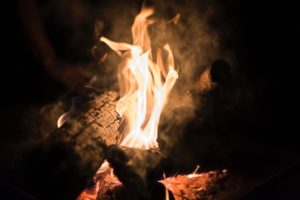
Photo by Josh Howard on Unsplash
It’s been a dark week, a week of deliberately moving into the things I have not loved. Drawing back was not an option. I could only step into the void. But the darkness has held a thousand small flames. The faces of old friends, both mine and Mom’s. Her animals, once so beloved but now forgotten by her, rehomed and doing well. A hundred acts of kindness and generosity. Help with moving furnishings into her new room. A cherry pie. Hugs and tears. The good-hearted friendliness of dogs. Constant support. Texts, emails, phone calls – all messages of succor and sympathy for me and my brother, for Mom. The friend who cares for the plants. The friends who keep an eye on the house. The friend who took a load to Goodwill for me. The friend who will take out the mountain of trash in the garage. And, when I came home, the arms of the friends who welcomed me back.
The shadows and the light. The things I have not loved cradle the things I do love. I am so weary I cannot begin to unravel the paradox. Perhaps it cannot be unraveled, only accepted and experienced. Perhaps Mom is wandering in her own dark wilderness, seeking the small campfire of her becoming, and when she finds it, leans down to breathe upon it, she will at last know peace.
Questions:
- Share three things you have not loved.
- Do things you have not loved persist in your life? What creates a background for what you do love?
- What is the difference between complaining (whining) and acknowledgment? Do you believe it’s wrong for you to admit to personal struggles?
To read my fiction, serially published free every week, go here: